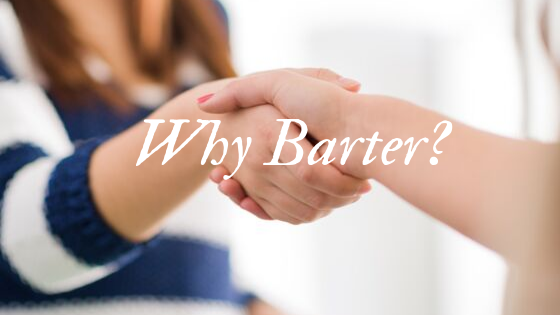Should you Ever Barter?
Bartering, by Webster’s Dictionary (and the IRS), is the trading of goods or services in exchange for other goods and services. This method of exchange dates back as far as 6000 B.C., read more about the history in this article History of Bartering.
Let’s face it, when you’re just starting a new business (or even if you’re not), you will need many services or products that you simply cannot afford to purchase at the time. Bartering is a good short-term solution and commonly practiced among small to mid-size businesses all over the world. It can also be used in personal transactions to fulfill a short-term goal.
Exchanging services and goods can be a valuable tool for cash-strapped businesses. Many small business owners and entrepreneurs exchange or trade services and products from Intangible or intellectual properties such as training, knowledge, experiences, copyright ownership to testimonials and referrals as well as, legal, accounting, and bookkeeping services. Tangible goods and products are also used, such as rental property, houses, boats, cars, etc… The exchanges and possibilities of this method of payment are endless.
Who Benefits from Bartering?

The barter agreement should be mutually beneficial for BOTH parties. You should know exactly what your needs are, what you’re willing to exchange, AND the fair market value of the services or products being traded before moving forward in a barter agreement.
Things You Should Know.
- There may be tax implications. In some cases, you will need a Tax Identification Number or TIN. Just because no cash exchanges hands, doesn’t mean you’re exempt from paying taxes. Click here to find out more about the IRS rules for bartering, they may or may not apply to your situation.
- The fair market value of the services or products being traded; is it fair and of equal value for both parties? Let’s say you’re trading your photography services for website design and build, you must consider your hourly rate or project rate, the amount of time it will take to complete and any supplies, equipment, or other items needed, as part of the calculation to determine fair market value.
What You Should Do Differently.
Being new to the world of Virtual Assisting, I’ve had the need and opportunity to barter my Virtual Assistant services in exchange for a purchase I made on “credit”. In exchange for a monthly payment, my debtor and I opted to exchange administrative duties to repay the debt. We decided on a set number of hours per week that would offset the debt.
Because I was eager to learn something new and pay off the debt, I failed to have provisions included for what happens if certain events or actions did or did not take place, such as, a specified END DATE.
The Dos and Don’ts You Should Know About.
Dos:
- Be sure the person(s) you are trading with is TRUSTWORTHY!!! I cannot stress this enough. Be sure the person can perform the services needed. With products and goods, be sure they have ownership rights AND the products are not defective or have been recalled. Trustworthiness is one of the biggest pitfalls when it comes to bartering.
- Your homework. Find the average cost or market value of the service(s) or product(s). For example, you may need tax accounting services which may cost anywhere from $1500-$2000 in exchange for a vacation rental property for a week, which could cost approximately the same.
- SIGN A CONTRACT!!! This is a BIG one y’all. Having a contract spells out all the terms and eliminates confusion. It should answer any questions that could arise. Use one of the free services like Hello Sign or DocuSign to upload, email and get an electronic signature. Do Include the following:
- An end date. If this is not a one-off project, product or goods, there should be an end date or timeframe of completion in the agreement.
- A clause that stipulates what happens if there is a breach by either party or if either party cannot fulfill their end of the agreement.
- Also, a clause that states how much any additional service(s) will cost and when and how it shall be paid. For example, if you are building a 5-page website and the other party wants an additional page(s) added, list what your price will be for any additional work or services performed not outlined or is outside of the agreement.
Don’ts:
- Enter into the agreement if you don’t need the service or product. For what? Remember, the arrangement should benefit both parties, don’t feel pressured or obligated.
- Avoid at all costs entering into the agreement If you get a bad feeling, trust your gut. Pay attention to the early warning signs and red flags. If your antenna goes up, walk away.
- Assume you are exempt from paying taxes, click on the above link to find out more.
- Avoid entering into an agreement between friends and family. Let’s be real y’all, our family and friends may not have a full understanding of how bartering really works, #realtalk.
Now That You Know.
To sum it up, there are advantages and disadvantages to bartering. Bartering is primarily used as a solution to achieve a short-term goal but can also be for long-term goals, but that’s rare. It can be for as short as you need or as long as you need it.
The most important thing to remember is that the arrangement should mutually benefit both parties. It also must be with someone or business you trust as there are usually no warranties or guarantees you can rely on. Do your homework.
If you want to hear more about my Expert VA® services, click here to schedule your free 30-minute consultation. I help authors and speakers build or increase their online presence. I manage your online content, while you manage your book and speaking gigs.
Be sure to share your bartering experience below in the comments.

